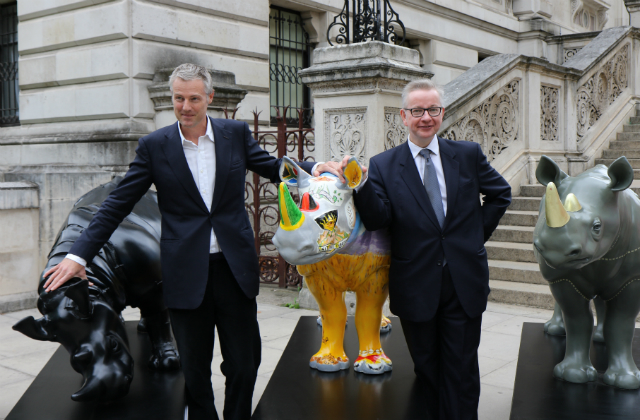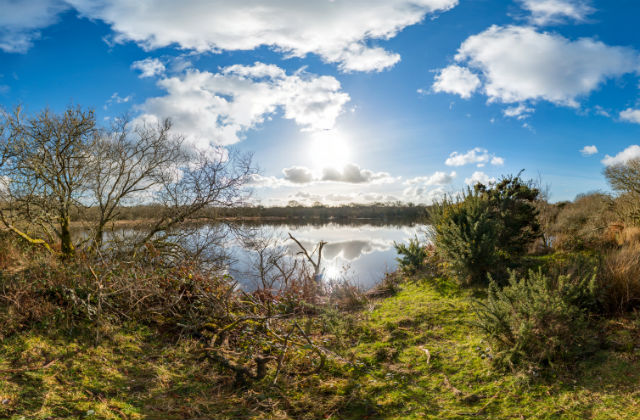£6 million more to tackle the Illegal Wildlife Trade ahead of major conference in London

Today there has been coverage in the Daily Mail, Sunday Times, Telegraph, Sunday Express and ITV News of an announcement by the UK government to provide an additional £6 million to protect some of the world’s most iconic and endangered species including rhinos, elephants and pangolins from the Illegal Wildlife Trade (IWT).
The fresh support from the Department for International Development comes as London prepares to host a landmark conference to stamp out IWT next week (11/12 October). This will be the largest conference ever to be held on this issue and will bring together countries from across the globe to build strong coalitions and commit to action on helping to end wildlife crime.
Environment Secretary, Michael Gove said:
Environmental challenges do not respect borders, and require coordinated international action, for example through support for green corridors.
Our Illegal Wildlife Trade Challenge Fund is driving change to combat this despicable criminality and highlights our global leadership in protecting wildlife in its natural environment. The fund’s priorities reflect our commitment in the 25 Year Environment Plan to work with other nations to stamp out this vile trade.
I look forward to the UK welcoming more than 80 nations next week at the fourth international Illegal Wildlife Trade conference in London. This will be the biggest conference ever on tackling the illegal trade and provides a golden opportunity to work together on this vital issue.
Pictures on the two page feature highlight the wide range of items, such as elephant ivory tusks to guitars containing rosewood, that are being illegally sold around the globe.
It is reported by the newspaper that seizures have risen in just five years from 300 to about 1,000, partly thanks to better intelligence and partly because of soaring demand for wildlife body parts for vanity or “medicine”.
Stuart Winter in the Sunday Express has interviewed Zac Goldsmith, the IWT conference champion and the MP for Richmond Park said that: “I am hoping the countries taking part commit to specific actions, from taking on the criminals to tackling demand that fuels the trade and ensuring the communities on the front line are incentivised.”
The IWT conference will also establish new moves to clamp down and pursue the criminals perpetrating this vile trade. Environment Minister, Thérèse Coffey travelled to Mozambique last month to see the work of rangers and meet with representatives of the Mozambique government to discuss measures to tackle IWT.
Environment Minister, Thérèse Coffey told the Daily Express:
We expect a Finance Task Force to be established next week.
A lot of focus is on stopping animals being killed. But we need to go up the chain to intervene in crime and by working together we can try to frustrate the criminals.
Ahead of the conference, President Ali Bongo of Gabon has told the Independent that: "Our resolve to protect elephants has never been stronger". He is looking forward to the ‘unique opportunity’ that the conference gives to build on the successes of African conservation such as the Elephant Protection Initiative and the Giants Club.
Action on air quality

Saturday’s Times, the Today Programme and BBC News reported on further action to tackle air pollution in the UK, inaccurately warning that air pollution is worse than previously thought.
The Government takes its air quality obligations extremely seriously and is firmly committed to improving air quality and cutting harmful emissions. The good news is we’re going in the right direction. Some areas that were breaching legal limits no longer are and the national, long-term picture is one of improving air quality. Across the UK, emissions from a pollutant known as nitrogen dioxide (NO2 ) have gone down by 27% since 2010 and are at their lowest level since records began.
Of course we know there is more to do - and quickly. Air pollution can have a devastating impact on our health, which is why we have announced further plans to support ongoing work to better air quality - including our £3.5billion national Air Quality Plan.
The Government has launched the supplement to its plan to improve air quality.
Earlier this year we required 33 areas to investigate what more could be done to speed up improvements. Most of these areas have already reached the target or identified actions that will make it happen more quickly - which we will fund.
Some councils used the opportunity to use more recent data and were able to show that they had improved, like Wakefield who credit this to the opening of the Eastern Relief Road.
However there are councils that have not yet found the right solution, or identified roads with even more challenging problems. We have required eight councils to do more detailed work.
Beyond this, the council recognises even more significant action is needed to tackle transport emissions and it will now work with a joint Defra and Department for Transport team over the next year on a more extensive plan to bring down emission levels as quickly as possible. The Government will support this important work and fund the research necessary to deliver solutions.
Speaking about the new NO2 plan supplement, Environment Minister Thérèse Coffey said:
While air quality has improved significantly in recent years, we will keep up our leadership with local councils to tackle roadside air pollution in our towns and cities.
The Roads Minister Jesse Norman and I have written to the leaders of all the authorities that have submitted feasibility studies to thank them for their hard work and underline that Defra will continue to support them to improve air quality in their areas.
Tackling air pollution has to be a joint effort. In Westminster I will continue to play my part, working hard to implement a national strategy and working closely with local councils.
But every one of us as individuals also has an important role to play in cleaning up our air. By taking simple steps, like leaving the car at home for the school run, riding a bike, walking, or taking the bus to work, we can make huge strides in our journey to clean up our air.